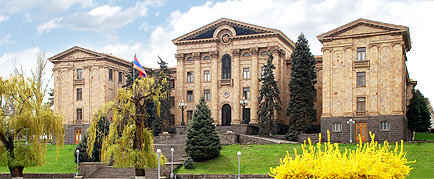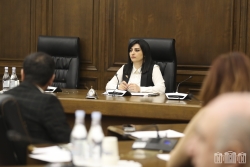The state body that accredits a journalist will be given the opportunity to suspend the accreditation of a journalist, if the latter violates the disciplinary rules in the work zone of that structure. According to the substantiation of the draft, the state structure establishes the grounds for suspending the accreditation of a journalist, however, in practice, in case of those grounds, it cannot suspend the accreditation of a journalist in any way. For that, the application of the implementer of media activities submitted for accreditation is necessary.
The deputies of the Civil Contract Faction Artur Hovhannisyan and Lilit Minasyan propose an addendum to the Law on Mass Media.
According to the journalistic organizations, this change is aimed at silencing free speech and restricting the activities of journalists.
The Chair of the NA Standing Committee on Protection of Human Rights and Public Affairs Taguhi Tovmasyan met with the representatives of the journalistic community to discuss the above-mentioned legislative proposal. She has noted that the representatives of the parliamentary factions and the authors of the bill do not take part in the discussion, although there has been an invitation to participate. Taguhi Tovmasyan considered it worrisome that the issue was not discussed with the journalistic organizations.
The President of the Union of Journalists of Armenia Satik Seyranyan is sure that the state bodies can make arbitrary decisions with that change. In her opinion, the grounds for accreditation should be clearly established in the draft in order that the journalist’s behavior is predictable for him/her and he/she knows in which case he/she may be deprived of accreditation.
According to the Chairman of the Committee to Protect Freedom of Expression Ashot Melikyan, this is the part of the step-by-step process under implementation. He added that the proposed regulation has nothing to do with the international approaches. Ashot Melikyan expressed an opinion that deprivation or suspension of accreditation should not be in our legislation.
Speaking about principal differences in the activities of the state bodies, the President of Yerevan Press Club Boris Navasardyan noted that the accreditation is expedient only in the National Assembly, taking into account the peculiarities of the activity of that structure and the special protection of the regime. The rapporteur highlighted the inclusion of self-regulation mechanisms in the NA procedure for the accreditation, the dialogue between the staff and the journalists. He added that not only journalists, but also the deputies should have obligations to maintain the procedure and expressed an opinion that the issue of the activity of the Ethics Committee in the National Assembly should be resolved.
The editors and the representatives of the media expressed their concerns over the regulations of the bill, attached importance to the discussion of the issue with the professional organizations in detail. There was an opinion that the regulation does not comply with the provisions of the Constitution and contradicts the international obligations ratified by our country. In the context of the solution of legislative issues, the effective cooperation of journalistic organizations and state structures was highlighted. The issue of the efficiency of the current accreditation process was touched upon.
In her final speech, the Committee Chair Taguhi Tovmasyan highlighted the bilateral adherence to ethical norms and informed that she initiated a process of formation of the Ethics Committee. According to her, each editorial office should develop and publish the rules of ethics that it will follow. “This is the best way of self-regulation,” the Committee Chair said.
Taguhi Tovmasyan proposed to organize a collection of signatures, to apply to the authors asking to take back the draft, as well as to apply to the Government with a request for a negative conclusion. According to the Committee Chair, as a result of discussions, an option acceptable to both sides should be found.




 18.11.2024
18.11.2024
